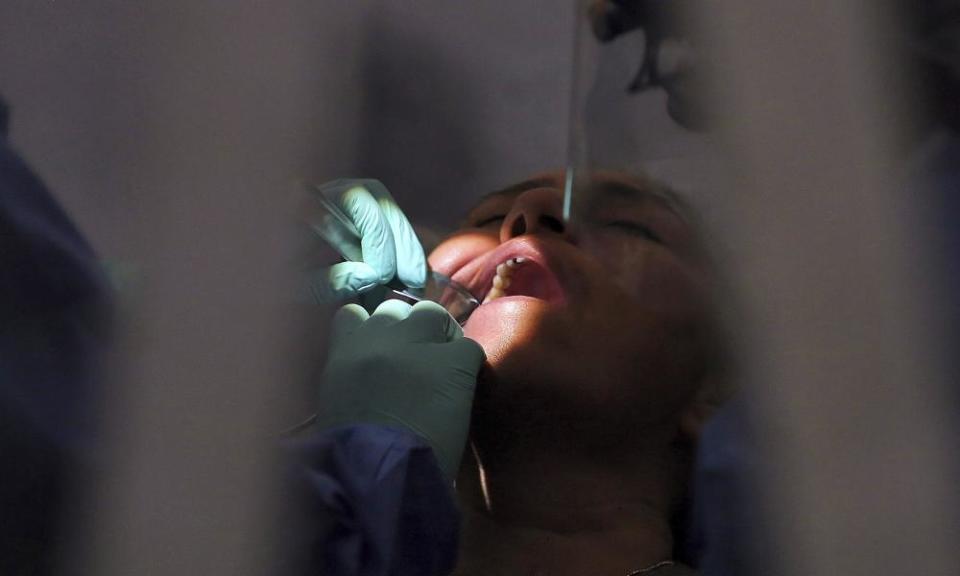Millions in US hope plan to expand dental care survives cuts to Biden’s bill

Dory Adams, 67, who lives outside Atlanta, was diagnosed with osteoradionecrosis due to radiation treatment she received in 1999 for oral cancer. Effectively, the radiation weakened the bone in her jaw.
Related: Applications to US nursing schools rise as students want to ‘join the frontline’
“I have endured hours and hours of trauma and pain in the dental chair, and paid thousands of dollars, only to find out that I have lost my battle to osteoradionecrosis,” said Adams. “I live with pain every single day with every single bite. My jaw creaks and pops when I talk and chew. It constantly reminds me, relentlessly, that I am scarred.”
But the pain is not her only worry.
Since her cancer, Adams hasn’t been able to pay for health insurance to afford the care needs until she became eligible for Medicare. She now requires surgery to her jawbone, but the dental care after the surgery isn’t currently covered. Because of the concerns she has about the costs for the dental care, surgery and ICU hospital stay, she is delaying the surgery.
“Dental care is a quality-of-life issue. If I have this surgery to save my jaw only to end up with no teeth on my bottom jaw, how will that affect my quality of life? I’m so depressed lately that all I think about is death,” Adams added. “What am I going to do? I really don’t know. For now I will just take the meds, avoid difficult foods and try to take special care of what teeth I have left.”
She is one of about 24 million Americans with Medicare – nearly half of all Medicare beneficiaries in 2019 – who had no dental insurance coverage and could not afford to pay out-of-pocket for dental care. The same rate of Medicare beneficiaries did not visit a dentist in the past year, with Black, Hispanic, Native American and low-income Americans disproportionately affected.
Average costs for common dental procedures far exceed the average monthly benefits in social security many Medicare beneficiaries rely on as their sole or main source of income.
But part of the Biden administration’s Build Back Better plan could offer help – as long as it survives cuts wanted by centrist Democrats who want to reduce the legislation’s top-line $3.5tn price tag. The bill wants to expand Medicare to include dental coverage for millions of older and disabled Americans enrolled in the program, in addition to hearing and vision coverage.
Dental coverage would begin 1 January 2028, including preventative, basic and major dental treatments, including a full or partial set of dentures every five years. A 20% cost-sharing would be enacted for beneficiaries to cover preventive, screening and basic services, which would increase to 50% by 2032.
Senator Bernie Sanders has insisted the Medicare expansion is “non-negotiable”.
The majority of Americans support expanding Medicare to include dental care coverage. A poll of over 2,000 Americans conducted by CBS/YouGov in October found that 84% support federal funding to expand Medicare to include dental, vision and hearing coverage.
“Dental care is so expensive without insurance that it’s often skipped. It’s the No 1 medical service people in America skip due to costs,” said Melissa Burroughts, who leads the oral-health-for-all campaign for the advocacy group Families USA.
“Medicare oral health coverage, if Congress adds it as they’re considering right now, would mean over 60 million older adults and people with disabilities would not only be able to afford really important dental care, but would also be healthier and have lower healthcare costs.”
The American Dental Association is opposing the proposal to expand Medicare to include dental coverage, instead advocating for a means-tested version of dental coverage for seniors with annual incomes around $39,000 and below. Medicare advocates have criticized this alternative policy, citing the various risks involved in expanding means testing for Medicare beneficiaries that could undermine the program and decrease access and affordability for care.
Julie Carter, senior federal policy associate at the Medicare Rights Center, outlined the extensive health and social problems that can arise from Medicare beneficiaries not being able to afford dental care, from worsening or causing serious health issues to people not being able to eat or avoiding social interactions due to poor oral health.
“We don’t feel like it should ever have been excluding dental care and we really want a comprehensive benefit within the Medicare program to combat all of these issues,” said Carter. “We don’t want it to be a standalone program, we want this to be folded into the Medicare program and to be treated like the integral part of the body that the mouth is. We’re really hoping that something comes together that can actually make this care possible.”

 Yahoo Movies
Yahoo Movies 